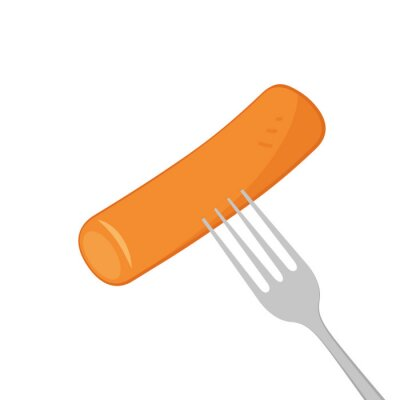Fork in Watered-Down Tteokbokki
I don’t think I ever grew out of my Pororo training chopsticks. Well, I guess they’re gone now—probably in a landfill somewhere with my blanket, named “Puddle” after its gray (originally white) color. My sister had greeted me one day, “Unni, Mom threw Puddle and Pororo away.” Running through the glass doors of my room, I flung my first-grade backpack onto the growing pile of laundry. The cupboards slammed open and closed. My already unmade bed grew messier. I cried that day. Maybe it was because I found Puddle and Pororo in the trash can or maybe it was because of the onion scraps already piled on top or maybe I was just an emotional kid.
It was supposed to be some “It’s time for you to grow up” message. I did—about 50% my blanket upgraded to a cleaner and bigger one. But the other half? The chopsticks? I live by “fork supremacy.”
At ten, I was still asking waitresses, “Yeogiyo, can we get a fork?” I said “we” instead of “I” because I was supposedly old enough to stop using forks. It used to be two forks that I’d ask for, one for my younger sister and one for me, and then “we” made sense. But by 2017, my sister was using chopsticks (yes, even her), but I still wasn’t saying “I” because it put me on the spot. By the way, my sister is two and a half years younger.
The waitresses would return. “And who is this for?” they’d ask, but their toothless smiles were directed towards my younger sister. The question was supposed to just be a formality.
“Me.” At this point, I’d stare at our neighboring table’s half eaten kimchi jeon, but I’d still catch the momentary surprise followed by the squinting of the waitresses’ eyes and the tensing of their mouths. The flickers lasted just long enough to rid the possibility of it being my imagination—which was often the culprit of many misunderstandings (I was still an emotional kid).
By twelve, I was stabbing naked tteok with forks. You see, the other very “non-Korean” thing about me is that I have a nonexistent spice tolerance. So my family would order tteokbokki (Korean spicy rice cakes) or kimchi or ramen, and I’d be filling up a bowl with water. Well, kimchi I simply refused to eat—they were spicy vegetables and I didn’t like spice nor vegetables. As for the other two, I’d plop the noodles and the tteok in my bowl and swirl them until they turned naked and the water turned red. Then I’d force them into my mouth.
A Korean without chopsticks and gochujang (red chili paste used in almost every Korean dish out there) is a silly thing and sometimes I’ll laugh at the absurdity. I guess I’m laughing at myself. Then I’ll wonder if it’s justified because I’m technically Korean American—maybe sporks took the spot in my brain that was supposed to be reserved for chopsticks. Or maybe the “Chopsticks should be extensions of your fingers and you should feel withdrawal symptoms every five days without gochujang” part of my DNA got tangled up all wrong in my ATGCs (for all science purposes, this is a joke). I’ll laugh at this thought too.
But sometimes, on those occasions when I do stop laughing and decide to take things seriously (I am fifteen now after all, and fifteen is a good time to start thinking), I wonder if it’s a sad thing. I wonder if I’m washing away half of what I’m supposed to be when I rinse my tteokbokki in water, pour the remnants down the drain. I wonder if I’m tossing aside my Korean side when I toss the chopsticks aside, opting for my fork instead.
And then I think back to my Pororo training chopsticks. How I had them in the beginning like a normal Korean and all I had to do was move from training wheels to two-wheel bikes. But I just didn’t care enough and didn’t try enough. And maybe that’s all I needed and then maybe I would actually deserve the Korean in Korean American.

